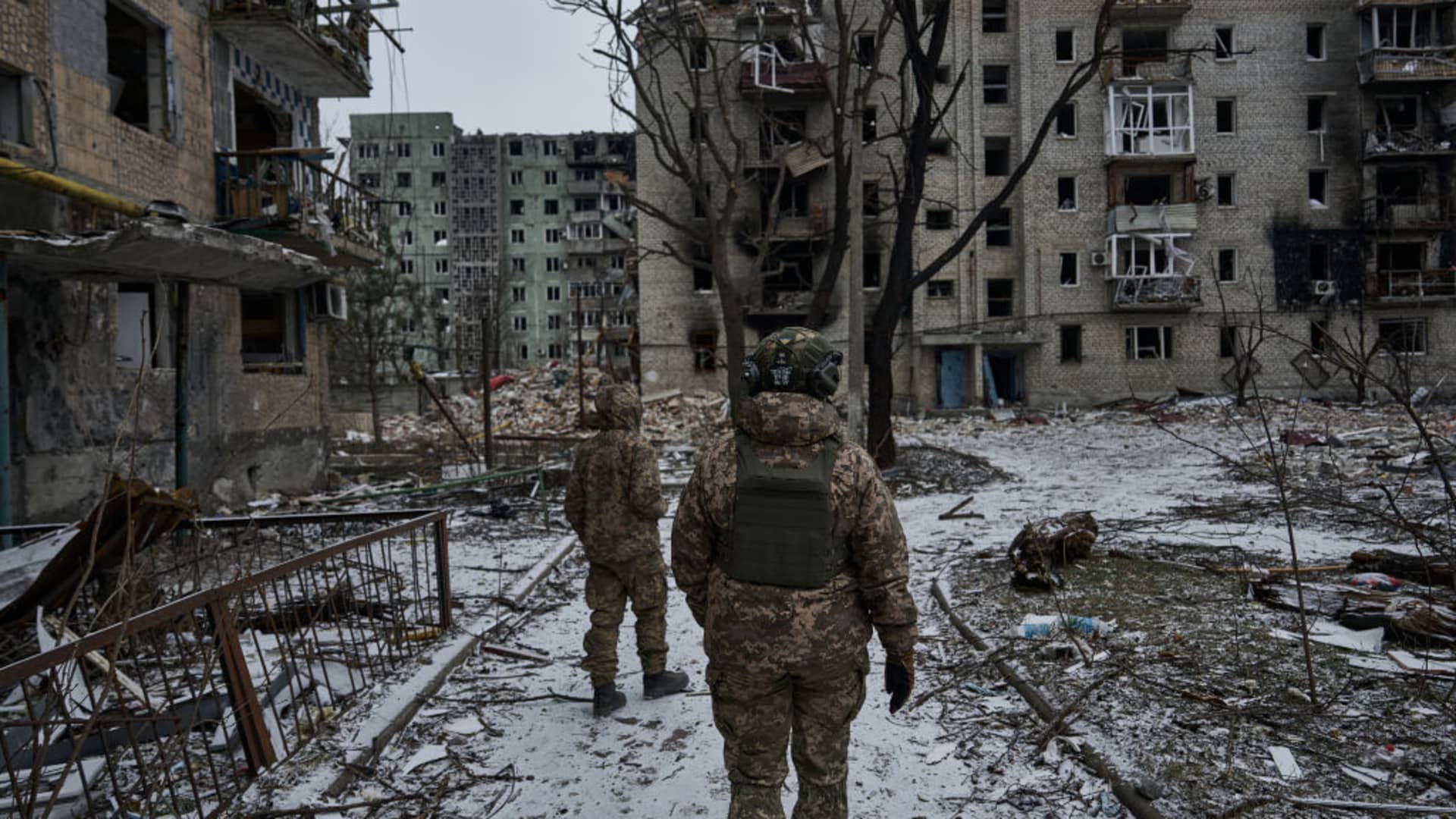This was CNBC’s live blog tracking developments on the war in Ukraine. See below for the latest updates.
Russian President Vladimir Putin on Friday gave his first public confirmation that he plans to run for re-election in March 2024, according to state media.
Putin made the comment during a medal-giving ceremony, Tass reported.
His participation in the vote scheduled for March 17 — which was widely expected — is all-but guaranteed to deliver him a fifth term in power amid widespread repression of political opposition.
Meanwhile, the fate of U.S. aid for Ukraine hangs in the balance — little progress has been made since Senate Republicans on Wednesday blocked an emergency spending bill to provide billions in funds for Kyiv, Israel and domestic security for the Mexican border.
Republicans, many of whom are growing wary of the level of U.S. funding for Ukraine, are leveraging the bill to seek tighter immigration controls on the U.S. border with Mexico. Biden has indicated some willingness to make changes on border policy to pass what he argues is a crucial support package for Ukraine, the U.S. and the world, but the issue remains in limbo.
The White House warned earlier this week that U.S. provision of military supplies to Ukraine will likely run out by the end of the year without the release of additional funds.
Moscow on Thursday expressed hope the bill would continue to be obstructed.
In Ukraine, troops continue to fight to recapture territory and reinforce defensive lines as harsh winter conditions set in.
Officials reported heavy Russian use of aerial attacks in eastern Ukraine, as well as a switch to the use of smaller attack groups unleashing heavy fire in the intense struggle for the bombarded city of Avdiivka in the eastern Donetsk region.
Russian and Belarusian athletes who qualify for the 2024 Paris Olympics can take part in the Games as so-called “Individual Neutral Athletes,” the International Olympic Committee said in a statement on Friday.
This means they will not be able to wear or carry flags or emblems and no national anthems will be played for them. They will only be able to compete in individual sports and not be allowed to represent their countries as teams.
Neither athletes nor support personnel that “actively support the war” will be allowed to take part, the IOC said.
— Sophie Kiderlin
The Ukrainian parliament on Friday approved three bills necessary to start European Union accession talks, including one on national minorities’ rights, a critical demand from Hungary which opposes Ukraine’s EU bid, officials said.
Lawmaker Yaroslav Zhelezniak said on Telegram messenger that members of parliament voted in the final reading for the bill regarding minorities’ rights, taking into consideration the expert assessment of the European Council.
Budapest has clashed with Kyiv over what it says are curbs on the rights of ethnic Hungarians in west Ukraine, in particular regarding education.
The other two bills adopted concern staff increases in the National Anti-Corruption Bureau and additional power for the National Agency on Corruption Prevention on assets checks.
“Just now Ukrainian parliament passed three out of four laws by constitutional majority identified by the European Commission as leftovers in the EU Enlargement report,” Deputy Prime Minister Olha Stefanishyna said on X.
She added that a fourth requirement – a law on lobbying – was approved by the cabinet on Tuesday.
The 27 national EU leaders are due to decide next week on whether to accept the European Commission’s recommendation to invite Kyiv to begin membership talks.
Any such decision however requires the unanimous support. Hungarian Prime Minister Viktor Orban has repeatedly said Hungary would not support the Commission’s proposal in its present form.
— Reuters
Russian President Vladimir Putin on Friday said he would run for another presidential term in 2024, state-owned news agency Tass reported.
Putin confirmed his intention to run during a conversation with attendees of a ceremony in the Kremlin to award medals for Russia’s Heroes of the Fatherland day, according to Tass.
Elections are scheduled for March 17.
There was little doubt that 71-year-old Putin would seek a fifth term in power in an election in which his success is near-guaranteed due to oppression of political opponents, his continued domestic popularity and his deeply-entrenched grip on power. That is despite sporadic protests against Russia’s war in Ukraine, particularly the ever-rising human, economic and geopolitical costs.
Putin has led Russia since 1999, variously as prime minister and president, during which time laws have been altered to prolong and extend his leadership. Another term would see his presidency extended until at least 2030.
— Jenni Reid
Kremlin spokesperson Dmitry Peskov on Friday dismissed a suggestion that Russia might engage in peace talks in 2024 on terms set out by Kyiv.
“It’s absolutely unrealistic,” Peskov told reporters regarding the issue, Russian state-owned news agency Tass reported.
Two sources told NBC News last month that U.S. and European officials had quietly broached “delicate” conversations with Kyiv over potential terms on which it might be willing to negotiate.
Ukrainian officials and President Volodymyr Zelenskyy have consistently maintained Ukraine is not willing to cede any territory to Russia, and that it will not engage in any talks that suggest this.
— Jenni Reid
Ground fighting has intensified as Ukrainian forces battle to hold off Russian advances on the war-torn city of Avdiivka, officials say.
Located 22 km north of the Russian-held regional center of Donetsk, Avdiivka has come under heavy bombardment by Russian forces for months, and just 1,500 residents are reported to remain from a pre-war population of more than 32,000.
Ukrainian serviceman Andriy Shyshuk said Russia had switched tactics to sending groups of up to five men on the offensive along with armored vehicles, air cover and bursts of heavy fire, Reuters reported.
Separately, a Ukrainian military spokesperson said the number of combat clashes on the front line had “significantly increased,” and that Russian losses of personnel and equipment were mounting.
— Jenni Reid
Ukraine began using train platforms on Thursday to bypass a border blockade by Polish truck drivers, Ukrzalynitsya, Ukraine’s rail network, said.
The first train deployed in the operation moved 23 trucks across the border from Ukraine into Poland, a statement said.
Officials were working out ways to speed up the procedure and efforts were underway to have trucks moved in the opposite direction, into Ukraine.
Drivers were being moved across the border by bus, the statement said.
Polish truckers began blocking the main corridors into Ukraine last month in protests against the terms of EU access for Ukrainian lorries. The blockage has led to higher prices for fuel and some food items as well as delays to drone deliveries to the Ukrainian army.
Valeriy Tkachyov, deputy director of the commercial department at Ukrainian railways, earlier told Interfax Ukraine news agency that the train was loaded and ready to go.
Tkachyov said the Ukrainian and Polish sides were currently harmonising technical issues.
“As soon as this test train passes and all is well, we will launch this on a mass scale,” Tkachyov said.
Ukrainian authorities say about 3,000 trucks are blocked on the Polish side of the border and authorities have not been able to agree with the protesters on terms to stop the action.
Polish hauliers’ main demand is to stop Ukrainian truckers having permit-free access to the European Union, something that Kyiv and Brussels say is impossible.
— Reuters
The hardest part of the winter period is yet to come, an Ukrainian intelligence official said Thursday, warning that Ukraine needs to strengthen air defenses ahead of expected Russian strikes on Ukraine’s energy infrastructure.
“Russia is retaining certain capabilities to produce various types of weapons. It is a serious challenge for Ukraine’s security and defense forces and the pro-Ukrainian coalition. We need more support. The hardest part of winter is ahead,” Andrii Yusov, the representative of the Main Intelligence Directorate at Ukraine’s defense ministry, said during a nationwide telethon Thursday, media outlet Ukrinform reported.
Russia’s missile stocks are much lower compared to last year and the beginning of the full-scale invasion, Yusov said, but he warned that the threat of Russian missile and drone attacks on Ukraine’s civil and energy infrastructure remains.
Ukraine has braced itself for another season of intense attacks on its power networks after its experience last year of attacks and power blackouts. State-owned power grid operator Ukrenergo said in April that Russian forces had used over 1,200 missiles and drones to attack Ukraine’s energy infrastructure since October 2022. With 250 of those weapons hitting their desired targets, over 40% of the energy grid was damaged, the operator said.
Ukrenergo described last winter as “the most difficult heating season in the history of the Ukrainian energy system,” saying “no European energy system has experienced such a large-scale destruction attempt.”
— Holly Ellyatt
An emergency spending bill to provide billions of dollars in new security assistance for Ukraine and Israel was blocked in the U.S. Senate on Wednesday as Republicans pressed their demands for tougher measures to control immigration at the U.S. border with Mexico.
The vote was 49 in favor to 51 against, leaving the $110.5 billion measure short of the 60 votes needed in the 100-member Senate to pave the way to start debate, threatening President Joe Biden’s push to provide new aid before the end of 2023.
The vote was along party lines, with every Senate Republican voting no along with Senator Bernie Sanders, an independent who generally votes with Democrats but had expressed concerns about funding Israel’s “current inhumane military strategy” against Palestinians.
The bill would provide about $50 billion in new security assistance for Ukraine, as well as money for humanitarian and economic aid for the government in Kyiv, plus $14 billion for Israel as it battles Hamas in Gaza. Senate Majority Leader Chuck Schumer, a Democrat, also voted “no” so that he could introduce the measure again in the future.
After the vote, Schumer noted the risks if Ukraine falls, saying it was a “serious moment that will have lasting consequences for the 21st century,” risking the decline of Western democracy. Republicans said it was essential to make their case for tighter immigration policies and control of the southern border.
“Today’s vote is what it takes for the Democratic leader to recognize that Senate Republicans mean what we say,” Senate Republican Leader Mitch McConnell said in a floor speech earlier on Wednesday. “Then let’s vote. And then let’s finally start meeting America’s national security priorities, including right here at home.”
Even if the bill passes the Senate, it still would need to be approved in the Republican-controlled House of Representatives, where dozens of Republicans have voted against Ukraine aid, including Speaker Mike Johnson.
— Reuters
Putin’s spy chief says Ukraine could become a ‘second Vietnam’ for the U.S. as it drags on resources





